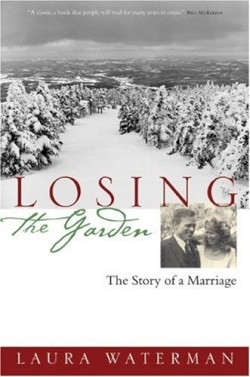Losing the Garden
The Story of a Marriage
In 1971 the author and her husband, Guy (who have together written five books and innumerable articles on wilderness preservation, mountain climbing, and the outdoor life) gave up jobs in New York to move to Vermont and homestead. A planner by nature and temperamentally unsuited to the corporate world, Guy spent months making charts of how the couple could best live “a deliberate life.” Their goal was “to live on the land and for the land,” and, for twenty-nine years, they succeeded.
While outsiders might have considered Guy and Laura’s lifestyle sparse, the two found ways to accommodate their passions without giving up their principles. Guy, once a professional musician, moved his piano, and they both brought books. Friends came to visit, bringing gifts, and news from the outside world came via the post office. At moments, Laura’s descriptions of their rituals—Guy reading aloud to her as she finished dinner—sound idyllic.
On February 6th, 2000, Guy left Laura and the home they had built together. This book is a memoir of a woman forced to ask herself, “How could I support my husband’s decision to commit suicide?” The daughter of Thomas H. Johnson, one of the pre-eminent Emily Dickinson scholars, she had grown up in a household with an alcoholic genius for a father. Her mother alternated between rebellion and resentment, concealing her problems with alcohol much better than her husband. Educated at Hollins, Laura rejected the academic life, moving to New York and working as an editor before marrying. Long accustomed to keeping secrets, Laura rarely questioned Guy’s decisions.
Guy grew up on a farm in Connecticut. Educated at the Taft School in Connecticut, Guy was “expected to attend Yale,” and succeed at his chosen profession. Any interests he might have had were supposed to be relegated to weekends and vacations. Rejecting Yale because of the school’s “anti-Semitism,” he embarked on a career as a jazz musician while attending George Washington University full-time.
A legend in climbing circles, Laura knew of Guy’s reputation long before they met. With their murky family histories, they knew the dark side of marriage—yet in the ultimate act of optimism, made the choice to marry in an attempt to transcend their pasts.
Her description of their marriage is an honest accounting of the challenges inherent in the institution. Her account of Guy’s depression—two of his sons had died in accidents; one famously chronicled in Jon Krakauer’s Into the Wild—and subsequent suicide harbors no resentment or ill-will.
Her writing style is clear and precise. While the story she tells is dear to her heart and her grief is palpable, she never succumbs to sentimentality or pathos. Her largeness of spirit is apparent throughout the memoir and remains intact at the end.
Reviewed by
Pam Kingsbury
Disclosure: This article is not an endorsement, but a review. The publisher of this book provided free copies of the book to have their book reviewed by a professional reviewer. No fee was paid by the publisher for this review. Foreword Reviews only recommends books that we love. Foreword Magazine, Inc. is disclosing this in accordance with the Federal Trade Commission’s 16 CFR, Part 255.

